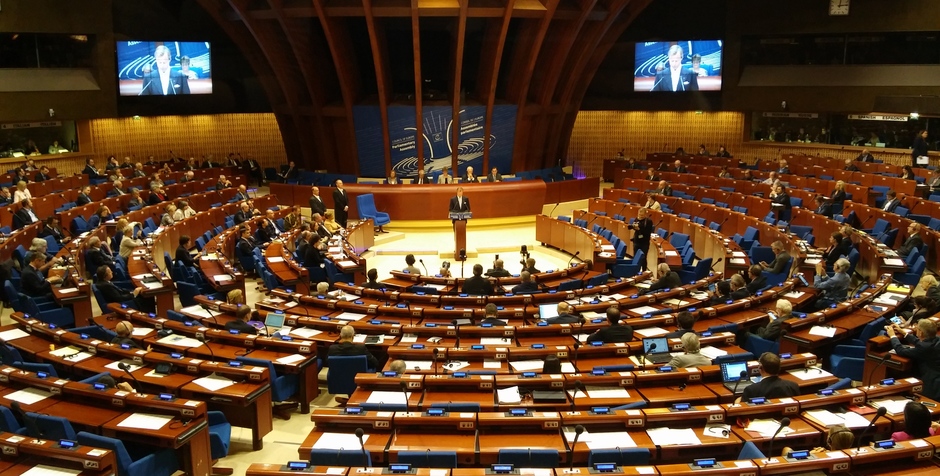

PACE Denounces Intolerance and Discrimination against Christians
Denounces discrimination on Christians
The Assembly of the Council of Europe encourages “reasonable accommodation” and denounces intolerance and discrimination against Christians
The Parliamentary Assembly of the Council of Europe (PACE) voted this Thursday, January 29, 2015 a Resolution on “Tackling intolerance and discrimination in Europe, with a special focus on Christians” (Res. 2036).
In a pluralistic and tolerant spirit, the text adopted by 67 votes against 2 aims primarily to remember that if religious minorities in Europe are victims of discrimination and intolerance, Christians are also victims of attacks and hate, without being as well protected.
The purpose of this text is to recall the equal rights of all denominations.
Christians suffer two major injustices according to the author of the text, Valeriu Ghiletchi (Moldovan, European People’s Party (EPP)). They are the first victims of vandalism: cemeteries defaced, churches vandalised, priests attacked and faith mocked. Several cases of physical and material damage are identified in the explanatory memorandum. The text also denounces unfair restrictions on freedom of conscience and expression of Christians: bishops are sued for preaching against marriage between persons of the same sex (Belgium, Ireland and Spain), nurses are forced to practice abortions against their conscience (Norway), conferences and seminars are prohibited (Austria, UK), civil servants are forced to marry same-sex couples (UK, Netherlands), and German parents are sentenced to fines and even to prison sentences for withdrawing their children from sex education classes. The author cites numerous cases, affairs and testimonies across Europe of these repeated attacks on freedom of conscience and religion. An overwhelmingly clear consensus developed at the PACE on these objective facts. The report was described as “balanced” by the socialist Mr Gunnarsson and as “magnificent work” by the Spanish MEP Ms. Quintanilla (EPP).
The amendments adopted during the meeting recall the right of religious communities to be legally recognized and to publish spiritual books. Turkey was particularly targeted by these amendments, because it still does not recognize the existence of the Catholic Church and other Christian denominations, especially the Syriacs’ and Protestant churches, which constitute real obstacles to religious freedom.
Only one amendment concerned the application of “reasonable accommodation” and proposed to “ensure that religious beliefs are not used as a pretext for discrimination towards any particular minority”. For example, some fear that by allowing conscientious objection for doctors, women seeking abortion could no longer find one who would perform such an act. But as the rapporteur says in its explanatory memorandum, the fact that about 80 Christian officials in the Netherlands since 2001 refuse to marry same-sex couples has never in fact prevented these couples from being married, as solutions have always been found.
The doctrine of reasonable accommodation is relativistic and places “the culture of living together” at the top of its values.
The doctrine of reasonable accommodation recommends the tolerance, insofar as possible, of the expression in the public space of various ideological and religious convictions. Whereas the concept French “laïcité” is very strict in limiting the presence of religion in public space and to ensure the monopoly of secular thinking, reasonable accommodations theory postulates that in a multicultural context, one must be flexible and respect the beliefs of everyone, so that everyone feels recognized and may live according to his or her philosophy or religion, as long as they respect the values of democracy
If Mr Kox, (Unified European Left) was “not convinced” by the text, only one member truly opposed it. This is the French Yves Pozzo di Borgo who was the apostle of the “French secularism”. But he was not supported: the only “secular” amendment also filed by five French, was not even voted on as no one would defend it. This is proof that the French thinking on secularism remains largely strange to the rest of Europe.
Finally, it may be pointed out that a third of the members supported a hostile amendment to the European Court of Human Rights, seeking to remove any reference to its case-law in the interpretation of the European Convention on human rights, concerning the right of parents to educate their children according to their beliefs.
Thus, through the vote of this Resolution, a signal is not only sent to governments to take religious freedom into better account, but also to the Court and its jurisprudence, which has become increasingly detached from the spirit of the Convention.











